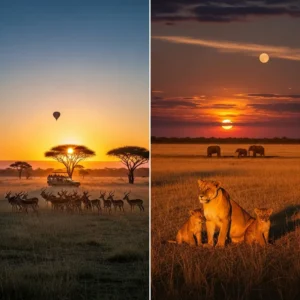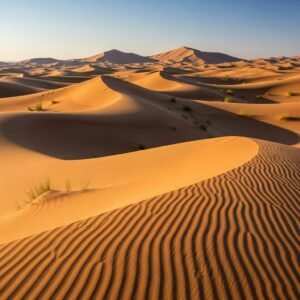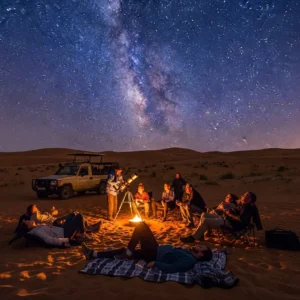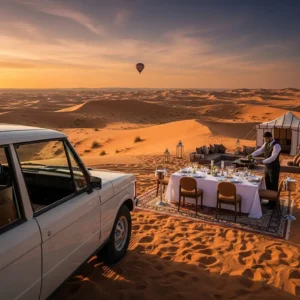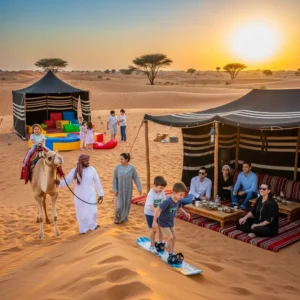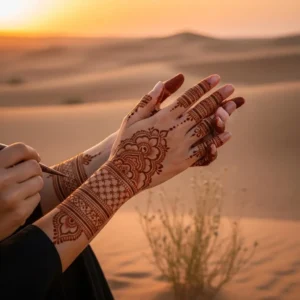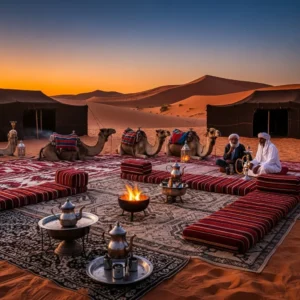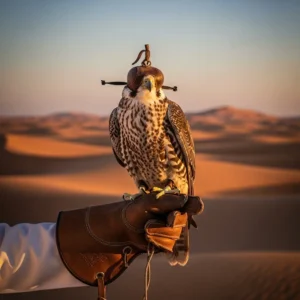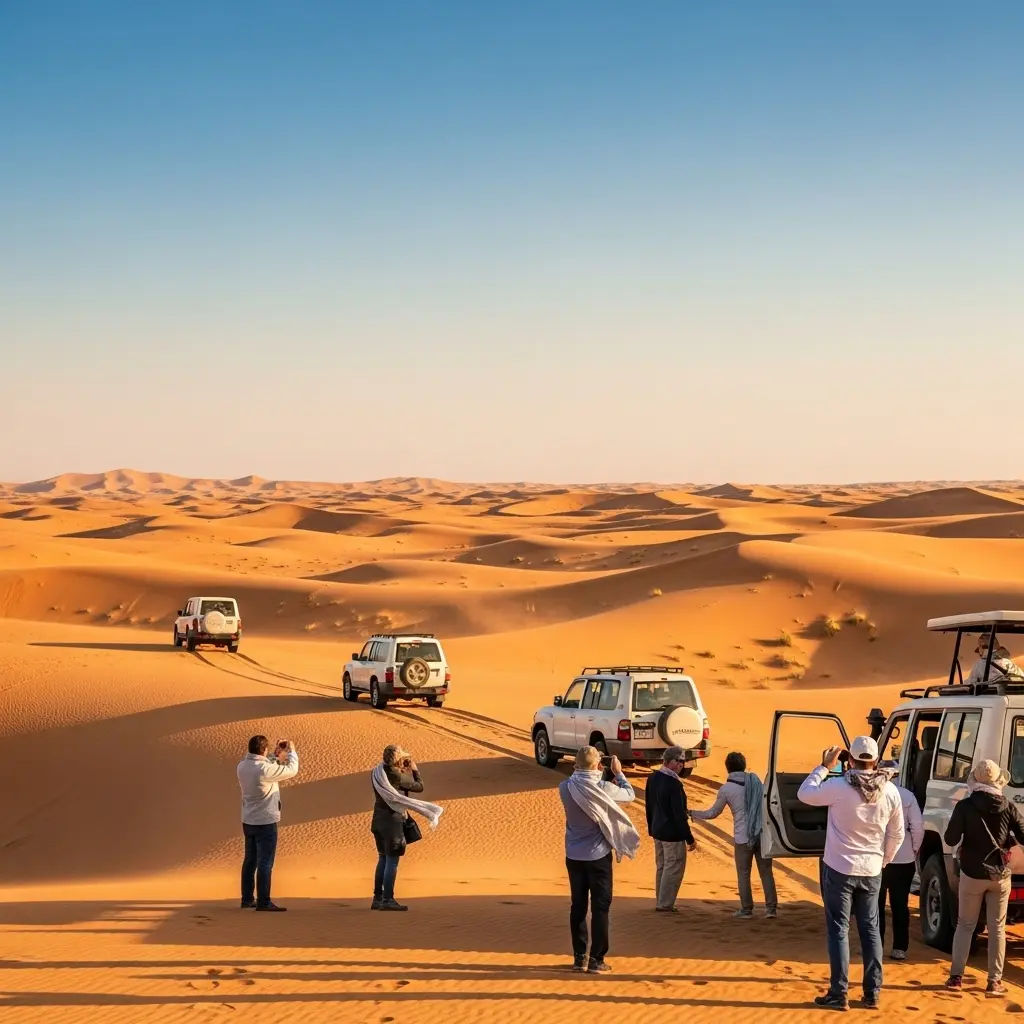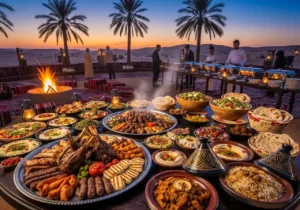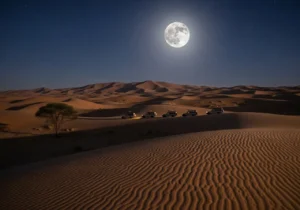Why November to March Are the Top Months for a Peak Season Desert Safari in Dubai
A desert safari in Dubai is a breathtaking, year-round adventure, but there is a magical five-month window when the experience transforms from simply great to absolutely perfect. Ask any seasoned traveler or local resident, and they will all agree: the period from November to March is the undisputed prime time for this iconic excursion. This is the peak season desert safari, a time when Dubai’s weather is idyllic and the desert is at its most inviting.
But what exactly makes these months so superior? The answer goes far beyond just “pleasant weather.” The climate during this golden window enhances every single moment of the safari, from the thrill of the dune bashing to the comfort of the Bedouin camp. It creates the perfect conditions for photography, adventure, and creating cherished memories.
This exhaustive guide will take you on a deep dive into the heart of the peak season. We will explore the five overarching reasons why this period is considered the best and then break it down month by month, giving you a detailed look at what to expect.
The “Why”: 5 Compelling Reasons for a Peak Season Desert Safari
While the primary reason is the glorious weather, its positive effects ripple through every aspect of the tour, creating a qualitatively superior experience.
1. Idyllic Weather Conditions: This is the number one reason. The scorching heat of the summer gives way to a perfect climate. Daytime temperatures are warm and sunny, while evenings are cool and crisp, creating the ideal environment for a full day of exploration followed by a comfortable night under the stars.
2. Enhanced Comfort for All Activities: Every activity is more enjoyable when you are not battling extreme heat. Dune bashing is more comfortable in an already cool vehicle, sandboarding is fun on dunes that aren’t scorching hot, and the gentle trek on a camel is a pure delight in the balmy air.
3. Superior Photography Opportunities: The winter months in Dubai are known for their crystal-clear blue skies and low humidity. This, combined with the soft, golden light of the late afternoon sun, creates a photographer’s paradise. The sunsets are often more vibrant, and the clear nights are perfect for stargazing.
4. A Buzzing City Atmosphere: Your desert safari is part of a larger trip to Dubai. During the peak season, the city is alive with energy, festivals, and events, from the Dubai Shopping Festival to New Year’s celebrations. The vibrant atmosphere of the city perfectly complements the magic of your desert adventure.
5. The Desert in Bloom: While it may sound surprising, the desert can bloom. The UAE’s scant annual rainfall typically occurs during the winter months. In the weeks following a rare shower, the desert landscape can be transformed, with a delicate green fuzz covering the dunes and small, hardy flowers making a beautiful, fleeting appearance.
A Month-by-Month Deep Dive into the Prime Safari Season
Each month within this golden window offers its own unique charm and character. Understanding these nuances can help you choose the absolute perfect time for your peak season desert safari.
November: The Golden Welcome to Winter
- The Weather: November marks the true beginning of Dubai’s beautiful winter. The oppressive humidity of summer vanishes, replaced by warm, sunny days (averaging 28-31°C / 82-88°F) and pleasantly cool evenings. The desert at night is refreshing, not yet chilly.
- The Experience: This is a fantastic month for a peak season desert safari as you get the benefit of the glorious weather before the main holiday rush of December and January. The city is vibrant, and the sense of relief from the summer heat is palpable.
- Why It’s Special: November strikes a perfect balance. It offers near-perfect weather with slightly smaller crowds and potentially better pricing than the absolute peak months that follow. It’s an ideal time for travelers who want the best of both worlds.
December: The Festive Desert Adventure
- The Weather: The weather continues to be magnificent. Days are comfortably warm, and the evenings become noticeably cooler and crisper. You will definitely want to bring a light jacket or sweater for the evening at the desert camp.
- The Experience: The festive spirit of Christmas and New Year’s Eve permeates Dubai, and this often extends to the desert safari experience. The city is buzzing, and the atmosphere is electric. However, this is one of the busiest months of the year. Booking your peak season desert safari far in advance is absolutely essential. Many operators, including https://royaldesertadventures.ae/, offer special New Year’s Eve packages.
- Why It’s Special: The combination of perfect weather and the global festive atmosphere makes for a truly celebratory and memorable desert adventure.
January: The Pinnacle of Climatic Comfort
- The Weather: January is statistically the coolest month in Dubai, which for many, makes it the absolute best. Daytime temperatures are often in the low to mid-20s Celsius (low 70s Fahrenheit), perfect for any outdoor activity. The desert nights can be genuinely chilly, dipping into the low teens (around 55°F). Warm clothing for the evening is a must.
- The Experience: This is the height of the tourist season. The weather is flawless, and the city is in full swing with the famous Dubai Shopping Festival. A peak season desert safari in January means experiencing the desert at its most comfortable, but also at its most popular.
- Why It’s Special: If you are sensitive to heat and want to experience the desert in the freshest, crispest air possible, January is your month.
February: The Heart of the Glorious Winter
- The Weather: The weather in February is very similar to January—perfectly clear, sunny, and cool. This is also the month with the highest chance of witnessing the rare spectacle of a greener desert landscape following any winter rains.
- The Experience: While still firmly in the peak season, the crowds can sometimes be slightly less intense than the absolute peak of the New Year period. It’s a fantastic time for a romantic safari, especially around Valentine’s Day. The comfortable conditions are ideal for longer, more immersive experiences like an overnight safari.
- Why It’s Special: February offers what many consider the sweet spot of the peak season desert safari: the best weather of the year combined with a slightly less frantic pace than the period from mid-December to mid-January.
March: The Beautiful Farewell to the Perfect Season
- The Weather: March signals the graceful transition from winter to spring. The temperatures begin to climb, but the days are still wonderfully pleasant, and the humidity remains low. The evenings at the desert camp are perfect—cool enough to be comfortable but not chilly.
- The Experience: This is your last chance to enjoy a desert safari in prime weather conditions before the heat of summer begins to set in. The city is often busy with spring break holidaymakers and various events.
- Why It’s Special: March offers a great balance. The evenings are warmer and more comfortable for sitting outside than in the heart of winter, while the days are still not too hot. It’s a fantastic final month for a perfect peak season desert safari.
What to Expect on Your Peak Season Safari
The idyllic weather enhances every single part of your adventure. Dune bashing is more pleasant, sandboarding is fun without the sand being too hot, and the camel ride is a delightful journey in the balmy air. The evening at the Bedouin camp is particularly special, as the cool, crisp air makes it wonderful to sit outside, enjoy the barbecue, and gather around a crackling bonfire.
Essential Packing for a Winter Safari
The key is layering. While your daytime attire might be a t-shirt, you will absolutely need to bring a warm layer for the evening.
- A fleece jacket, a warm sweater, or a pashmina.
- A beanie or warm hat, especially for January and February nights.
- Closed-toe shoes are always recommended for comfort and safety.
The Downside: Managing Crowds and Costs
The only real downside of a peak season desert safari is its popularity. This is the busiest time of year, which means larger crowds at the camps and higher demand for tours. Prices for flights and accommodation in Dubai are also at their peak. It is crucial to book your safari well in advance—weeks or even months ahead for dates around Christmas and New Year’s. Booking directly with a trusted operator like https://royaldesertadventures.ae/ is the best way to secure your spot. While you can browse options on portals like https://dubaidesertsafarie.com/ or https://hafiztourism.com/, be aware that availability can be tight.
Conclusion: An Unbeatable Experience
While a Dubai desert safari offers a magical escape at any time of year, the months from November to March provide the perfect canvas for an unforgettable adventure. The flawless weather elevates every moment, transforming a great tour into an extraordinary one. The comfort, clear skies, and vibrant atmosphere make the extra planning and booking in advance completely worthwhile. For a truly perfect journey into the Arabian wilderness, a peak season desert safari is, without a doubt, an unbeatable experience.
Frequently Asked Questions (FAQs)
1. How cold does it really get in the desert during a January night? It can get surprisingly cold. While the city might be mild, the clear, dry desert air loses heat quickly after sunset. Temperatures can drop to 10-14°C (50-57°F). It’s essential to bring a warm jacket, and if you’re on an overnight safari, warm sleepwear is a must.
2. Do I need to book a December or January safari far in advance? Yes, absolutely. This is the absolute peak of the tourist season due to the holidays. It is highly recommended to book your safari several weeks, or even a couple of months, in advance to secure your spot with a reputable operator and to avoid disappointment.
3. Is it likely to rain on my desert safari in February? Rain in Dubai is very rare, but February is the month with the highest chance of precipitation. However, this usually amounts to a few brief showers over the entire month. It is extremely unlikely that rain will affect your tour, but if it does, operators have sheltered areas at the camps.
4. Are morning safaris also best during these months? Yes. The period from November to March is the only time of year when morning safaris are truly comfortable and recommended. The cool morning temperatures are perfect for enjoying adventure activities like dune bashing and quad biking before the sun gets too strong.
5. Are the prices for a peak season desert safari much higher? The prices for the safari itself may be slightly higher, but the main cost increase is for flights and hotels in Dubai during this period. Safari operators may have less promotional pricing, but the increase is usually modest. The primary issue is availability, which is why booking early is key.
6. What is the Dubai Shopping Festival (DSF) and how does it affect my trip? DSF is a massive, city-wide retail festival that typically runs from December to January. It brings in a huge number of tourists, making the city and all its attractions, including desert safaris, much busier.
7. Is the desert landscape different in the winter? It can be. Following rare winter rains, the desert can experience a “greening” effect, with a fine layer of green shoots and small, colorful desert flowers appearing on the dunes. This is a beautiful and unique sight that you can only witness during the peak season desert safari.
8. Can I book a last-minute safari in January? It is possible but can be difficult. You may find availability with some operators, but the most reputable and popular companies are often fully booked. It’s always best to book in advance to ensure you get a high-quality and safe experience.
9. Are the entertainment shows at the camp the same in winter? Yes, the entertainment program, including the Tanura dance, belly dance, and fire show, is the same year-round. The only exception is during the holy month of Ramadan, when the entertainment is modified.
10. Is an overnight safari comfortable during the coldest months? Yes, it is very comfortable and magical. Reputable operators provide warm blankets, sleeping bags, and comfortable tents. Sleeping in the cool, crisp desert air under a clear, starry sky is an incredible experience and a highlight of the peak season desert safari.
11. What time does the sun set during the winter months? In the winter, the sun sets much earlier than in the summer. You can expect the sunset to be between 5:30 PM and 6:00 PM. This means the evening safari pickup times are also earlier, typically between 2:30 PM and 3:30 PM.
12. Is it less humid in the desert during winter? Yes, significantly. The winter months are characterized by very low humidity, which leads to crystal-clear skies and a very comfortable feeling in the air, both during the day and at night.
13. Are there any specific events in the desert camps for Christmas? While not a local holiday, many safari camps catering to tourists will have a festive atmosphere in December, with some decorations or festive music to acknowledge the season for their international guests.
14. If I have to choose one month, which is the absolute best? While the entire period is fantastic, many consider late November or late February/early March to be the “sweet spot.” These times offer the perfect balance of ideal weather, slightly smaller crowds, and potentially better pricing than the absolute peak of late December and January.
15. What is the main advantage of a peak season safari over a summer safari? The main advantage is comfort. While a summer safari is still enjoyable, the pleasant daytime temperatures and cool evenings of the winter season allow you to enjoy every single activity, from the dune bashing to relaxing at the camp, in complete comfort without having to worry about the heat.
16. Does the food menu change in the winter? The core menu remains the same, but the experience of eating is often enhanced. Enjoying a hot barbecue and warm Arabic coffee around a bonfire is particularly delightful in the cool evening air of a peak season desert safari.
17. Is it better to choose a safari in a conservation reserve during this season? A safari in a conservation reserve is a fantastic choice at any time of year. In the winter, however, the pleasant weather makes the nature walks and wildlife spotting opportunities that these tours often include even more enjoyable.
18. Will I need sunscreen in January? Yes, absolutely. Even though the temperature is cooler, the sun in Dubai is strong year-round. You must wear sunscreen to protect your skin during the afternoon portion of the safari.
19. What is the best thing to wear for an evening safari in December? The best approach is layering. Wear comfortable trousers and a t-shirt or light long-sleeved shirt, but bring a warm fleece jacket or a good sweater. Many people also appreciate having a scarf and a beanie for when they are sitting at the camp later in the evening.
20. How does the cooler weather affect the dune bashing experience? The cooler air means the car’s engine and air conditioning system run more efficiently, which can contribute to a smoother and more comfortable ride. The sand is also firmer in the cooler temperatures, which can make for a very exciting and responsive dune bashing experience.
